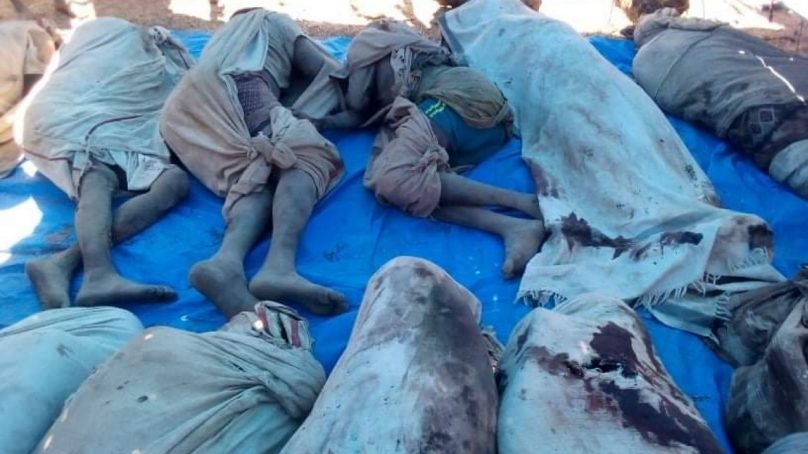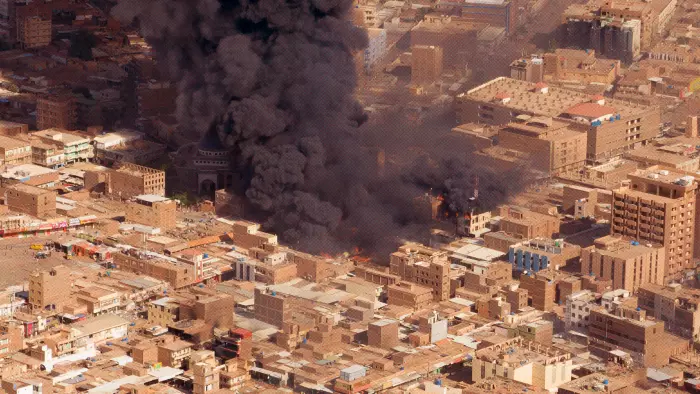
A secretive committee of senior officials in Ethiopia’s largest and most populous region, Oromiya, has ordered extra-judicial killings and illegal detentions to crush an insurgency there, our investigation reveals.
We interviewed more than 30 federal and local officials, judges, lawyers and victims of abuses by authorities. The agency also reviewed documents drafted by local political and judicial authorities. These interviews and documents for the first time shed light on the workings of the Koree Nageenyaa – Security Committee in the Oromo language, which began operating in the months after Prime Minister Abiy Ahmed came to power in 2018. The committee’s existence has not been previously reported.
Five current and former government officials say the committee is at the heart of Abiy’s efforts to end a years-old insurgency by the Oromo Liberation Army (OLA), which wants self-determination for the Oromo people and greater language and cultural rights. Oromos have long complained of political and social marginalisation. When new protests broke out in 2019, the government cracked down hard. The Koree Nageenyaa took the lead, the five officials said.
The violence in Oromiya has displaced hundreds of thousands of people. Ethiopia’s government and human rights officials accuse the OLA of killing scores of civilians since 2019, a charge the group denies.
One of the five sources was willing to be identified: Milkessa Gemechu, a former member of the governing Prosperity Party’s central committee. The others, including two people who have attended meetings of the Koree Nageenyaa, spoke on condition of anonymity.
The people familiar with Koree Nageenyaa’s activities attributed dozens of killings to the committee’s orders and hundreds of arrests. Among the killings, they said, was a massacre of 14 shepherds in Oromiya in 2021 that the government has previously blamed on OLA fighters.
We presented our findings to the head of the state-appointed Ethiopian Human Rights Commission (EHRC), Daniel Bekele. In an interview, Bekele confirmed the existence of the Koree Nageenyaa. He said its aim was to address growing security challenges in Oromiya, but it “overreached its purpose by interfering in the justice system with widespread human rights violations.”
“We documented multiple cases of extra-judicial killings, arbitrary detentions, torture and extortion,” Bekele said, without elaborating on specific incidents.
Ethiopia’s federal government, Prime Minister Abiy’s office and the Oromiya regional government did not respond to detailed questions for this article. Abiy has previously defended his government’s human rights record. On February 6, he told parliament during routine questions: “Since we think along democratic lines, it is hard for us to even arrest anyone, let alone execute them.”
The unrest in Oromiya, home to Ethiopia’s capital Addis Ababa, is a reminder of continuing instability in the Horn of Africa nation, a patchwork of many ethnic groups. Ethiopia is scarred by conflict. A two-year civil war in the northernmost region, Tigray, killed hundreds of thousands of people until a peace deal was struck in November 2022. Fighting erupted last July in another northern region, Amhara, between the Ethiopian army and local militiamen. There the federal government has imposed a state of emergency.
Violence in Oromiya has continued even after the federal government and OLA rebels held peace talks for the first time in early 2023. Ethiopia’s government has designated the OLA a terrorist organisation – a label that the United States and United Nations have not applied to the group.
According to the current and former Ethiopian officials, the Koree Nageenyaa meets in the Oromiya regional offices of Abiy’s Prosperity Party and is headed by Abiy’s former chief of staff, Shimelis Abdisa, the president of Oromiya region. Shimelis and other committee members are ethnic Oromo. Fekadu Tessema, leader of the Prosperity Party in Oromiya, sits on the committee, as does Ararsa Merdasa, head of security for Oromiya, and half a dozen other local political and security officials, the sources said. None of these people responded to questions.
There was no evidence that Abiy attended the meetings or that he issued orders to the committee. People familiar with the matter said the committee was formed at Abiy’s instigation. Abiy was briefed on at least one occasion in early 2022 about the committee’s activities, said a person who was present. It couldn’t be independently verified.
The security committee is little known beyond a tight official circle. We found one reference to it in the public record: a paragraph in a 2021 report by the Ethiopian Human Rights Commission about abuses of the justice system. The EHRC report said the committee – known as Yedehinineti Komītē in Ethiopia’s official language, Amharic – investigated and jailed people with suspected ties to armed groups instead of allowing the justice system to take its course.
Jaal Marroo, the military leader of the OLA, said in an interview that he is aware of the Koree Nageenyaa’s existence and that high-ranking officials in Oromiya are its members. He accused the committee of ordering extrajudicial killings, arbitrary detentions, harassment and intimidation, without citing specific examples.
Ethiopia has a long history of using a clandestine security apparatus to quell dissent, Ezekiel Gebissa, professor of history and African studies at Kettering University in the United States, explained.
During Haile Selassie’s four-decade rule last century, the emperor created a network of spies known colloquially as the “joro tabi,” or listeners, to hunt his opponents. The communist Derg military junta that toppled Selassie in 1974 set up a vast new security system to eliminate threats to the regime.
At the turn of the century, Ethiopia got a new constitution and parliament. But this government, too, led by Meles Zenawi, grew increasingly repressive and fashioned a top-down structure of surveillance that extended to every level of society. The system was commonly known as “Amist Le And” – one-to-five – because spies were typically assigned five people to monitor.
Abiy became prime minister in 2018. According to the current and former government officials, the Koree Nageenyaa security committee was formed soon afterwards in response to youth protests in Oromiya over inequality and economic mismanagement.
“The Koree Nageenya sits down and decides that a person needs to be detained. Then they go and arrest them without warrant or investigation or due process.”
Milkessa Gemechu, the former member of the Prosperity Party’s central committee, said he first heard of the Koree Nageenyaa at a meeting of Oromo political leaders in March 2019. There Shimelis, newly appointed as president of Oromiya, announced that the Koree Nageenyaa “would direct operations against enemy elements and enemy cells,” said Milkessa.
Shimelis and Abiy’s office didn’t respond to questions about the Koree Nageenyaa. We couldn’t independently verify Milkessa’s account of the meeting. Milkessa now lives in the United States. He says he left Ethiopia after receiving threats from security officials for criticising Abiy and the Prosperity Party, including over their handling of unrest in Oromiya.
From late 2019, the Koree Nageenyaa met in the Prosperity Party’s Oromiya regional headquarters in downtown Addis Ababa as often as three times a week, said the two officials who participated in some of the meetings. The building was emptied of other staff, attendees handed in their phones and documents were collected at the end of each session, these people said.
Abiy’s father is Oromo and he owes his premiership in part to youth-led protests in Oromiya that forced his predecessor, Hailemariam Desalegn, to resign. Nevertheless, unrest in the region quickly loomed as a major challenge for the new prime minister.
Ever since Emperor Menelik II’s campaign of conquest at the close of the 19th Century imposed Amhara culture and language on assimilated groups, Oromos have complained of political and social marginalisation. Oromos hoped their lot would improve with Abiy, but many became disenchanted when change didn’t materialise. New protests broke out in October 2019 and the Koree Nageenyaa cracked down.
When a prominent Oromo singer Haacaaluu Hundeessaa was killed in June 2020 in an attack the government blamed on Oromo rebels, clashes between protesters and police led to at least 200 civilian deaths and 5,000 arrests, human rights groups have said. Oromiya president Shimelis and regional Prosperity Party head Fekadu presided over a series of Skype calls with each of the 19 big cities and 21 zones of the region at this time, according to the two people who participated in some meetings of the Koree Nageenyaa.
Shimelis and Fekadu ordered some protesters arrested and others killed, the two people said. According to one of these people, Shimelis told one zonal administrator to have his forces shoot protestors if the demonstrations got out of hand. The sources did not specify numbers of people to be arrested or killed.
A former adviser to Shimelis told Reuters that in “important cases, like prominent executions,” orders come from Shimelis or Ararsa, Oromiya’s police commissioner until his promotion last year to head of security. One such case, the source said, was a massacre in early December 2021 of 14 tribesmen.
The killings were reported at the time in Ethiopia, but the blame for the crime has been a matter of dispute. We reviewed previously unreported official accounts of the incident and spoke to a local official who said he witnessed key moments leading up to the slaughter.
- A Reuters report











